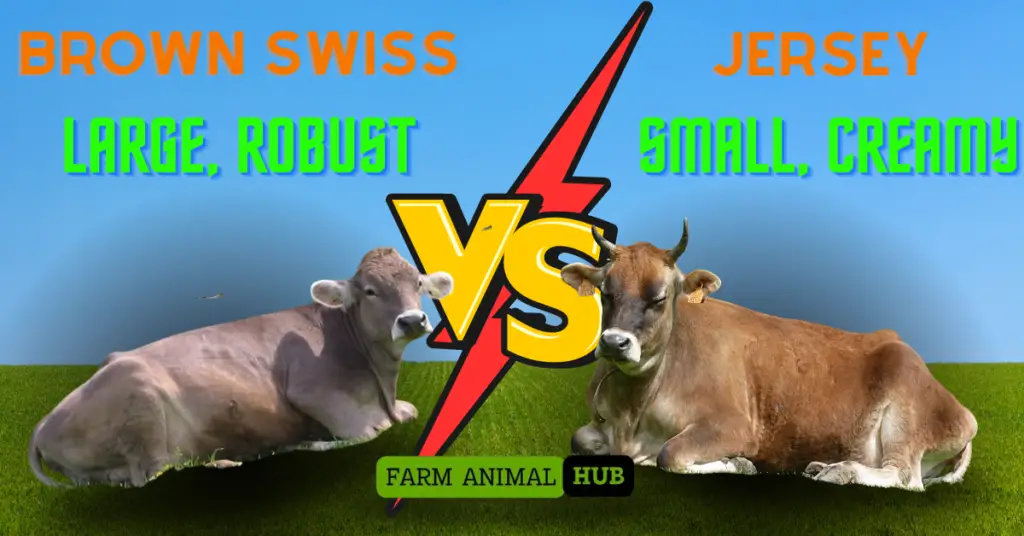
So, you’re thinking about starting a dairy farm, or maybe you’re looking to switch up your current herd. You’ve heard about Brown Swiss and Jersey cows, but you’re not sure which breed is the right fit for you. Don’t worry, friend, we’ve got you covered. In this down-to-earth guide, we’ll break down the key differences between these two popular dairy breeds to help you make an informed decision.
Brown Swiss and Jersey cows have their unique characteristics. Choosing the right breed for your farm is crucial for maximizing milk production and boosting your bottom line.
Brown Swiss vs Jersey Size
Let’s start with the obvious: size. Brown Swiss are the heavyweights of the dairy world, known for their large frames and muscular builds. They can easily weigh in at over 1,500 pounds, making them quite a sight to behold. Jerseys, on the other hand, are more petite, typically weighing between 800 and 1,200 pounds. This size difference can have implications for housing and handling, with Brown Swiss requiring more space and potentially stronger fencing.
Brown Swiss vs Jersey Price
The price of a dairy cow can vary widely depending on factors like genetics, age, and production history. Generally speaking, Brown Swiss tend to be more expensive than Jerseys due to their larger size and higher demand for beef. However, the price difference isn’t always significant, and finding a good deal on either breed is possible with a little research and patience.
Other Considerable Comparisons
Brown Swiss vs Guernsey
If you’re considering Brown Swiss, you might also be curious about Guernsey cows. Both breeds are known for their rich, golden milk and gentle dispositions. However, there are some key differences to consider. Brown Swiss tend to produce more milk, while Guernseys have a higher butterfat content. Ultimately, the choice between these two breeds depends on your priorities and production goals.
Holstein vs Jersey Milk
When it comes to milk composition, Jerseys reign supreme in the butterfat department, with their milk averaging around 5% butterfat. This makes their milk ideal for producing rich, creamy products like cheese and ice cream. Brown Swiss, while having a lower butterfat content (around 4%), boast higher protein levels, making their milk perfect for cheesemaking and yogurt production.
Jersey vs Holstein Milk Production
While Jerseys have a higher butterfat content, Holsteins are the champions of milk volume, producing an average of 80 to 90 pounds per day. However, Jerseys are known for their feed efficiency, meaning they produce more milk per pound of feed consumed. This can be a significant advantage for farmers looking to control costs and maximize profits.
Brown Swiss Milk Production Per Day
On average, a Brown Swiss cow can produce between 60 and 80 pounds of milk per day. However, factors like genetics, diet, and overall health can influence milk production, so it’s important to select healthy, high-producing cows for your herd.
Jersey Cow Colors
One of the most charming aspects of Jersey cows is their diverse range of colors and patterns. From fawn to mulberry to black, Jerseys come in all shades of the bovine rainbow. They’re also known for their expressive eyes and gentle demeanor, making them a favorite among dairy farmers and enthusiasts alike.
Side-by-Side Comparison Table
| Feature | Brown Swiss | Jersey |
|---|---|---|
| Production Purpose: | Dual-purpose (milk and beef) | Primarily milk |
| Meat Quality: | Good, but not as specialized as beef breeds | Lean, but less desirable than beef breeds |
| Milk Production: | Moderate to high volume, lower butterfat | Moderate volume, high butterfat |
| Growth Rate and Feed Efficiency: | Slower growth, moderate feed efficiency | Faster growth, high feed efficiency |
| Adaptability and Hardiness: | Adaptable to various climates | Heat tolerant, less cold tolerant |
| Temperament and Ease of Handling: | Docile and easy to handle | Docile, but can be more energetic than Brown Swiss |
| Calving Ease and Mothering Ability: | Easy calving, good mothers | Easy calving, good mothers |
| Overall Profitability: | Varies depending on market conditions | Varies depending on market conditions |
FAQ
What is aa the use of Jersey Brown Swiss?
There is no such thing as a “Jersey Brown Swiss.” Jersey and Brown Swiss are two distinct dairy breeds with their own unique characteristics and advantages.
Is Brown Swiss cow milk good?
Absolutely! Brown Swiss milk is known for its high protein content and rich flavor, making it perfect for cheesemaking, yogurt production, and drinking.
What is the Brown Swiss used for?
Brown Swiss cows are primarily used for milk production, but their large size and muscular build also make them suitable for beef production. They are considered a dual-purpose breed.
Is Jersey cow milk better?
It depends on what you mean by “better.” Jersey milk has a higher butterfat content than Brown Swiss milk, making it ideal for producing high-quality dairy products like butter, cheese, and ice cream. However, Brown Swiss milk is prized for its higher protein content, which benefits cheesemaking and yogurt production.
Conclusion
Choosing between Brown Swiss and Jersey cows ultimately comes down to your individual needs and preferences. Consider your production goals, climate, budget, and personal preferences when making your decision. Both breeds have a lot to offer, and with proper care and management, they can be valuable assets to your dairy farm.
We hope this guide has been helpful in your journey to choosing the perfect dairy breed. If you have any questions or comments, please feel free to share them below. And don’t forget to share this post with your fellow dairy enthusiasts!
